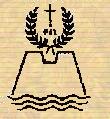|
EBIONITE
HERESY
The
Ebionites were Christians who considered Christ as a plain and
common man but with superior virtues. They also believed that
Christ was conceived and born like ordinary men. They rejected
the epistles of the apostles whom they considered apostates from the
law. They believed only the Gospel according to the
Hebrews.
They
observed all the Jewish ceremonial laws. Because of the
poverty of their knowledge and understanding, they received the name
Ebionite, meaning "poor man."
*
* *
CORINTHUS
THE HERESIARCH
The
follower of a heretical doctrine is called a heretic; but the author
of a heresy is called a heresiarch. Corinthus claimed he had
revelations written by an apostle and revelations from angels.
He preached a period of a thousand years of marriage festival.
He taught that Christ's kingdom is an earthly one consisting in
eating, drinking and marrying.
Once,
when the apostle John entered a building, learning Corinthus was in
the same building, he rushed out, unable to bear being under the
same roof as the heresiarch.
*
* *
THE
NICOLAITIANS
Mentioned
in the Apocalypse of John, these heretics claimed their founder was
Nicolaus, one of the first deacons. In truth, the heretics
misinterpreted and corrupted a statement of Nicolaus, "to abuse
the flesh," taking it to mean to live a life of licentiousness.
Nicolaus
had a beautiful wife whom he dearly loved and whom he eventually
gave up. He never committed fornication; his daughters lived
as virgins up to their old age, and his son remained
uncorrupted. When Nicolaus said, "to abuse the
flesh," he was inculcating self-control in the face of these
pleasures that are eagerly pursued.
*
* *
MARRIED
APOSTLES
Among
the apostles, Peter and Philip were stated to have children.
Philip is known to have given up a daughter in marriage.
It
is narrated that when Peter saw his wife being led to death, he
rejoiced because of her summons and her return home to heaven.
Addressing her by name, Peter said, "Oh thou, remember the
Lord." Such were the marriages among the apostles, and
their perfect disposition towards those dearest to
them.
Eusebius:
Church History
(05-11-05) | 